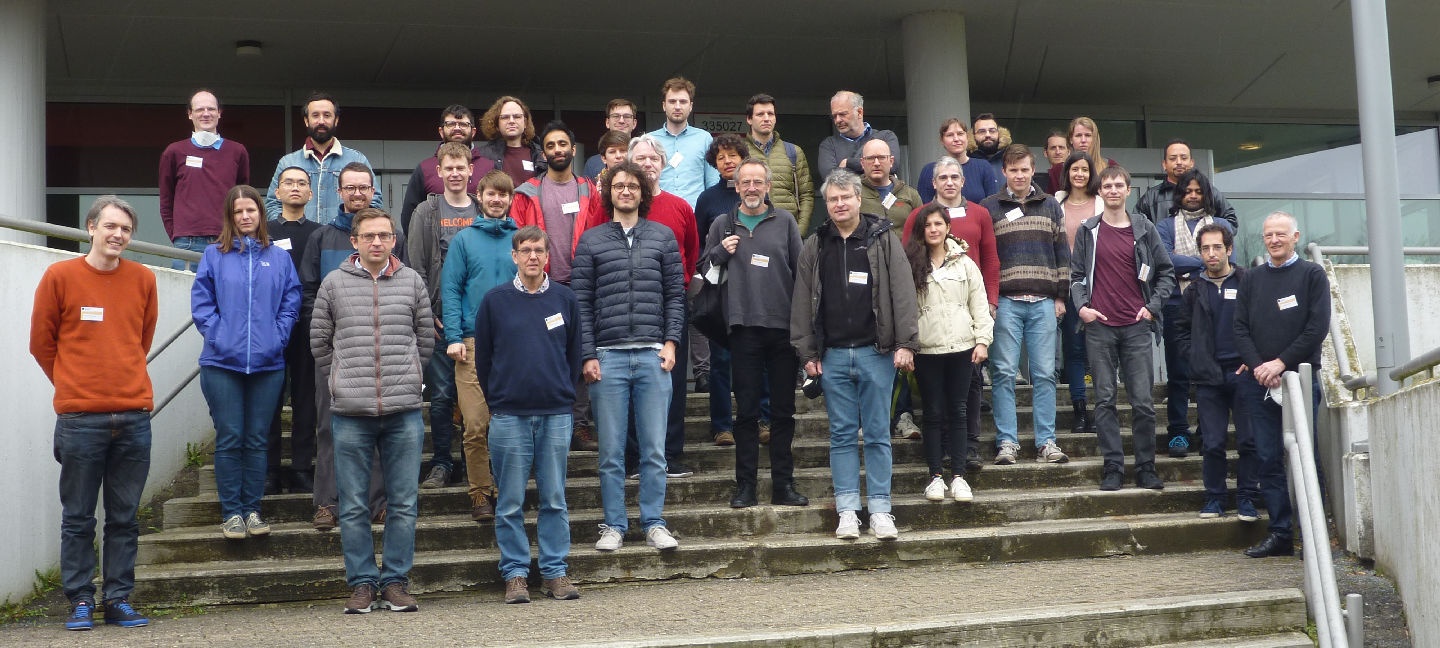Workshop "Geometry and Representations"
Saturday 09 April 2022
Location: Zentrum für interdisziplinäre Forschung (ZiF) in Bielefeld
Participation: This workshop is only for invited participants because of restrictions due to the pandemic.
Some form of Corona protection measures may apply, for example the "3G rule", which would make participation possible only for vaccinated (geimpft), tested (getestet) or recovered (genesen) persons. Participants may also be required to wear a medical mask indoors at all times except when at their fixed seats.
Organisers: Igor Burban, Bill Crawley-Boevey and Henning Krause
Workshop Speakers
- Martin Gallauer (MPI Bonn)
- Joachim Hilgert (Paderborn)
- Fabian Korthauer (Düsseldorf)
- Daniel Labardini (UNAM Mexico City)
- Charles Vial (Bielefeld)
- Alexandra Zvonareva (Stuttgart)
Workshop Picture
Workshop Programme
Saturday 09 April
| 09:00 | – | 10:00 | Charles Vial (Bielefeld) On splinters and full exceptional collections |
| Coffee break | |||
| 10:30 | – | 11:30 | Alexandra Zvonareva (Stuttgart) Derived equivalence classification of Brauer graph algebras |
| 11:30 | – | 12:30 | Daniel Labardini (UNAM Mexico City) Gentle algebras arising from triangulations of surfaces with orbifold points [Slides] |
| Lunch break | |||
| 13:30 | – | 14:30 | Martin Gallauer (MPI Bonn) Generation by permutation representations |
| Coffee break | |||
| 15:00 | – | 16:00 | Fabian Korthauer (Düsseldorf) Arithmetic representation growth of virtually free groups [Slides] |
| 16:00 | – | 17:00 | Joachim Hilgert (Paderborn) Poisson transforms and homological algebra [Slides] |
Talks and Abstracts
Martin Gallauer (MPI Bonn)
Generation by permutation representations
Let $G$ be a finite group and $R$ a ring. It is an interesting problem to find a convenient family of thick generators for the triangulated category of $G$-equivariant $R$-linear perfect complexes. (These are the $R$-perfect complexes within the derived category of $RG$-modules.) Akhil Mathew asked specifically (even for ring spectra $R$) when permutation modules constitute such a family. I will discuss the context of this question and describe some known cases. Based on joint work with Paul Balmer and on joint work in progress with Tobias Barthel.
Joachim Hilgert (Paderborn)
Poisson transforms and homological algebra
In this talk I will explain how methods from homological algebra have been used to solve problems from non-commutative harmonic analysis related to globalizations of Harish-Chandra modules. The key results are due to Kashiwara and Schmid, but there are more questions which may or may not be tractable by homological algebra.
Fabian Korthauer (Düsseldorf)
Arithmetic representation growth of virtually free groups
We adapt methods from the representation theory of quivers to deduce that several kinds of representations of virtually free groups over finite fields are counted by evaluating polynomials. Time permitting, we will sketch how this gives information on the cohomology of moduli spaces of representations.
Daniel Labardini (UNAM Mexico City)
Gentle algebras arising from triangulations of surfaces with orbifold points
I will report on joint work in progress with Lang Mou. We associate a gentle algebra to each triangulation of any unpunctured surface with orbifold points of order three. The $\tau$-tilting combinatorics of this gentle algebra coincides with the combinatorics of flips of triangulations. Moreover, whenever one mutates support $\tau$-tilting pairs, the corresponding Caldero-Chapoton functions obey a generalized cluster exchange formula, which means that the Caldero-Chapoton algebra is isomorphic to a generalized cluster algebra of Chekhov-Shapiro. We are able to define Derksen-Weyman-Zelevinsky-like mutations of representations, which is somewhat surprising, since the quivers we consider are allowed to have loops, and the matrix-mutation classes of their skew-symmetrizable matrices may fail to have acyclic representatives.
Charles Vial (Bielefeld)
On splinters and full exceptional collections
A commutative ring is called a splinter if any finite-module ring extension
splits. By the direct summand conjecture, now a theorem due to André, every
regular ring is a splinter. The notion of splinter can naturally be extended
to schemes. In that context, every smooth scheme in characteristic zero is a
splinter. In contrast, Bhatt observed in his thesis that the global geometry
of a smooth proper scheme in positive characteristic plays a significant role
as to whether or not it is a splinter; in particular, the splinter property is
not a local property for proper schemes in positive characteristic.
We observe that the core examples of smooth projective varieties that
(conjecturally) admit a full exceptional collection and that of smooth
projective varieties in positive characteristic that are splinters both
contain flag varieties and toric varieties. I will report on on-going joint
work with Johannes Krah where we explore potential connections between the
property of being a splinter and that of admitting a full exception
collection.
Alexandra Zvonareva (Stuttgart)
Derived equivalence classification of Brauer graph algebras
In this talk, I will explain the classification of Brauer graph algebras up to derived equivalence. These algebras first appeared in representation theory of finite groups and can be defined for any suitably decorated graph on an oriented surface. The classification relies on the connection between Brauer graph algebras and gentle algebras, which in their turn are related to partially wrapped Fukaya categories. We consider A-infinity trivial extensions of partially wrapped Fukaya categories associated to surfaces with boundary, this construction naturally enlarges the class of Brauer graph algebras and provides a way to construct derived equivalences. This is based on joint work with Sebastian Opper.
Contact
If you have any questions about the workshop, please contact the organisers at birep.
